Overview
The article centers on tools that can significantly enhance commercial operations within pharmaceutical strategies. It showcases a range of software solutions, including:
- CareSet
- Tableau
- Salesforce
- HubSpot
- Microsoft Power BI
- Oracle
- SAP
- Zoho
- Slack
- Asana
Each tool plays a crucial role in bolstering data management, operational efficiency, and strategic decision-making in the pharmaceutical industry. By leveraging these technologies, organizations can streamline their processes and make informed decisions that drive success. As the pharmaceutical landscape evolves, the integration of these tools becomes increasingly vital for maintaining a competitive edge.
Introduction
In the rapidly evolving pharmaceutical landscape, leveraging data-driven insights has emerged as a cornerstone for strategic growth and operational efficiency. As companies navigate the complexities of healthcare, tools and solutions that facilitate comprehensive data analysis, visualization, and management are becoming indispensable. Notably, CareSet’s extensive Medicare data analytics, Tableau’s powerful visualization capabilities, and Salesforce’s robust CRM systems each offer unique functionalities that empower organizations to refine their approaches to market access, patient engagement, and commercial operations.
This article delves into the transformative impact of these technologies, highlighting how they can enhance decision-making and foster collaboration within the pharmaceutical sector. Ultimately, this leads to improved patient outcomes and sustained business success.
CareSet: Comprehensive Medicare Data Analysis for Strategic Insights
CareSet stands as a leader in Medicare information analysis, delivering critical insights into patient demographics, treatment patterns, and provider networks for pharmaceutical companies. By harnessing over $1.1 trillion in annual claims information, CareSet empowers clients to identify new healthcare provider targets and refine their market access strategies. This robust, data-driven methodology not only enhances operational efficiency but also supports informed decision-making for product launches and patient engagement initiatives. Employing advanced analytical techniques and integrating over 100 external information sources, CareSet offers a comprehensive perspective essential for navigating the complexities of the healthcare landscape.
With extensive Medicare information solutions, CareSet equips healthcare participants with actionable knowledge derived from more than 62 million beneficiaries and 6 million providers, thereby improving healthcare provider engagement and informing strategic healthcare decisions. This holistic approach addresses immediate informational needs while fostering sustainable growth in the long term. We invite you to explore how CareSet’s analyses can align with your business objectives, as illustrated in the case study titled ‘Putting Patients First: Unlocking Medicare Data to Empower HCP.’ This case study highlights how CareSet’s insights drive sustainable growth and enhance patient engagement across the industry.
Tableau: Data Visualization Tools for Enhanced Operational Insights
Tableau distinguishes itself as a leading visualization tool, empowering healthcare firms to craft interactive and shareable dashboards that transform intricate datasets into actionable insights. In 2025, the pharmaceutical sector is witnessing a significant shift towards information visualization, with 36% of marketers leveraging online tools to generate visual content. This trend underscores the increasing recognition of visualization technologies in enhancing operational efficiency, setting the stage for the pivotal role of Tableau in commercial ops within the current landscape. By facilitating the visualization of complex information, teams can quickly identify trends, monitor key performance indicators, and make informed, evidence-based decisions. The platform’s user-friendly interface allows individuals with limited technical skills to explore information effectively, establishing it as an essential resource for enhancing operational understanding and promoting strategic initiatives.
Recent advancements in information visualization tools, particularly when combined with artificial intelligence and immersive technologies, are poised to further revolutionize the healthcare landscape. The case study titled “Future of Data Visualization in Pharma” illustrates how the convergence of these technologies is anticipated to accelerate transformation within the industry. Effective applications of Tableau have demonstrated its capacity to enhance operational understanding in commercial ops, yielding an average annual cost reduction of $287 million for large pharmaceutical companies through strategic visualization investments.
As the industry evolves, the impact of Tableau on commercial ops and operational efficiency becomes increasingly apparent. Organizations that leverage the power of data visualization tools, in conjunction with innovative data science products from CareSet Systems—such as advanced analytics for Medicare data and predictive modeling—are better equipped to navigate the complexities of the healthcare environment. This synergy ensures they remain competitive and responsive to market demands, ultimately empowering stakeholders with actionable insights for drug lifecycle management. As visualization technologies advance, they will unveil new opportunities for drug discovery, development, and delivery—benefiting the patients who rely on medical innovation for improved health outcomes.
Salesforce: CRM Solutions for Streamlined Commercial Operations
Salesforce distinguishes itself as a powerful CRM platform specifically designed to empower businesses in managing customer relationships with precision. Its features address the unique needs of the life sciences sector, enabling teams to efficiently track interactions, manage leads, and automate marketing campaigns. This enhancement of commercial ops not only boosts productivity but also allows sales teams to concentrate on cultivating significant connections with healthcare providers and stakeholders. In 2025, the implementation of CRM solutions in drug firms is anticipated to significantly enhance operational efficiency, with research indicating that enterprises utilizing CRM platforms can experience revenue growth of up to 245%. This statistic is particularly relevant as it aligns with CareSet’s evidence-based findings, which underscore the importance of accurate Medicare information in driving sales and improving market access strategies for biotech and healthcare firms. CareSet’s comprehensive Medicare data solutions equip healthcare stakeholders with actionable insights, enhancing their capacity to engage effectively with healthcare providers.
Salesforce’s latest features for life sciences encompass advanced analytics, AI-driven insights, and seamless integration with over 100 external data sources, delivering comprehensive visibility into treatment patterns and patient demographics. Furthermore, Salesforce optimizes customer relationship management by automating routine tasks, thereby liberating valuable time for sales representatives to connect with clients more effectively. Expert opinions affirm the critical role of CRM solutions in drug commercial ops, highlighting their contribution to enhancing market access and patient engagement strategies. For instance, the recent collaboration between SDG Group and Snowflake aims to improve patient care and business outcomes, exemplifying how CRM software can drive strategic development in the healthcare sector. Successful implementations of Salesforce CRM within life sciences organizations have demonstrated its effectiveness in enhancing commercial ops, fostering strategic growth, and ultimately improving patient outcomes. As the healthcare CRM software market continues to expand, with a projected valuation of USD 4,356.3 million in 2024, Salesforce remains an indispensable tool for businesses seeking to navigate the complexities of the healthcare landscape. CareSet’s dedication to fostering long-term strategic growth for its partners further emphasizes the value of integrating robust CRM solutions like Salesforce in commercial ops, particularly in enhancing healthcare provider engagement through actionable Medicare data.
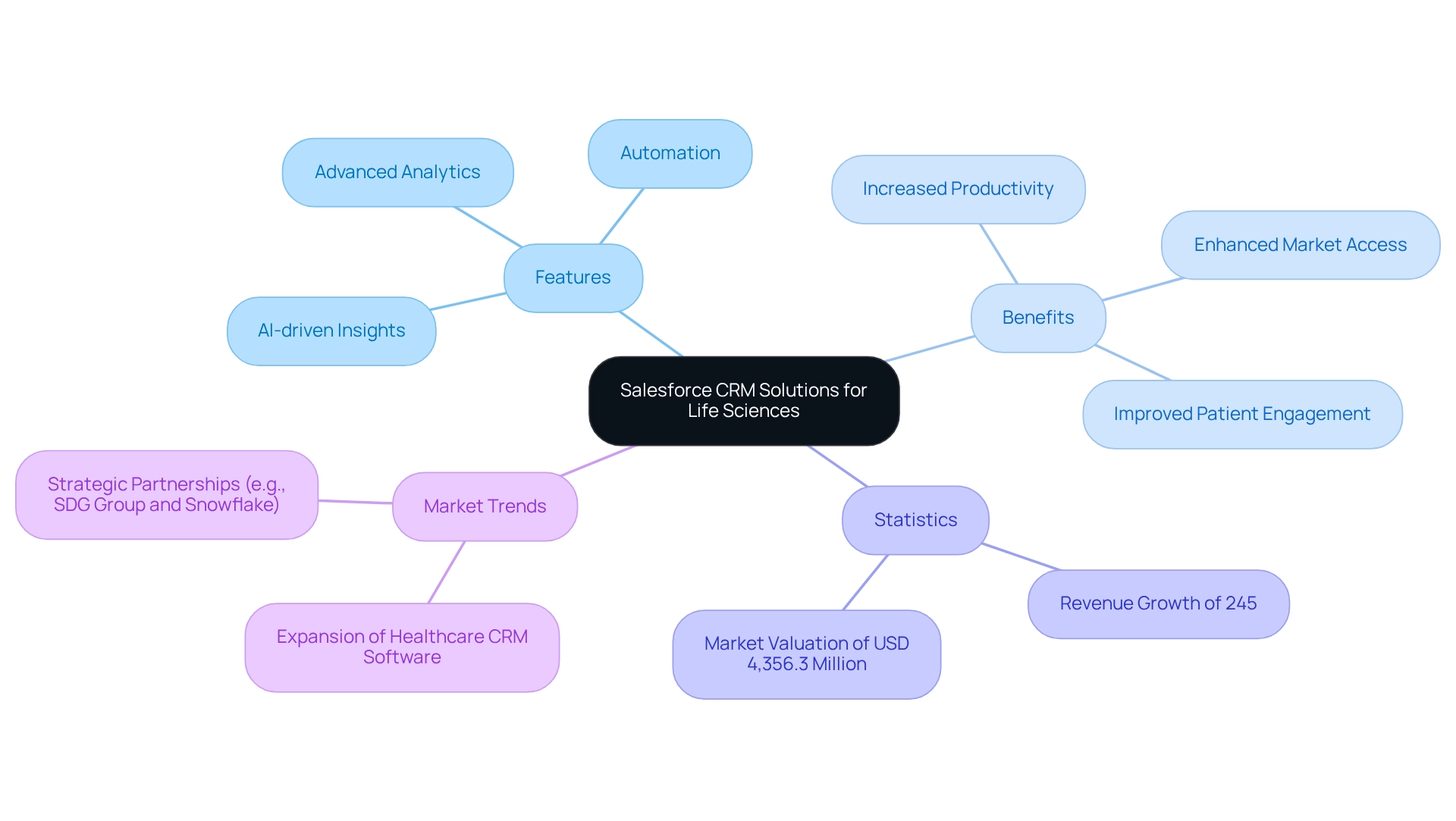
HubSpot: Marketing Automation for Optimized Outreach Strategies
HubSpot provides a comprehensive suite of marketing automation tools designed to enhance outreach strategies for drug manufacturers. By automating processes such as email campaigns, social media management, and lead nurturing, HubSpot enables teams to engage healthcare professionals with increased efficiency. This automation not only saves valuable time but also ensures that marketing initiatives are precisely targeted and data-driven, resulting in higher conversion rates and improved patient engagement.
As we look to 2025, the marketing automation landscape in healthcare is evolving swiftly, with organizations leveraging these tools to achieve significant operational efficiencies. Statistics reveal that businesses utilizing marketing automation experience enhanced customer engagement and streamlined workflows, culminating in impressive returns on investment. Organizations that adopt these technologies can anticipate substantial cost savings and accelerated revenue growth, which is vital as the global market for AI in marketing is projected to reach $107.54 billion by 2028. This growth underscores the importance of integrating advanced automation tools like HubSpot for healthcare businesses aiming to remain competitive in this dynamic environment.
Case studies illustrate that the effective application of HubSpot’s marketing automation tools has revolutionized outreach strategies within the medical sector. Companies have successfully implemented these tools to refine their marketing efforts, resulting in more meaningful interactions with healthcare professionals and ultimately driving improved patient outcomes. For instance, CareSet’s extensive Medicare information solutions empower drug firms by providing insights from over 62 million beneficiaries and 6 million providers, enhancing their strategies and interactions with healthcare providers. As noted by SEO Strategist Albert Badalyan, “Businesses that actively use these tools report improved customer engagement, reduced workflows, and exceptionally high ROIs.” Furthermore, CareSet’s analytical capabilities augment HubSpot’s tools by delivering actionable insights that boost the targeting and effectiveness of marketing campaigns, ensuring that drug firms can optimize their outreach efforts.
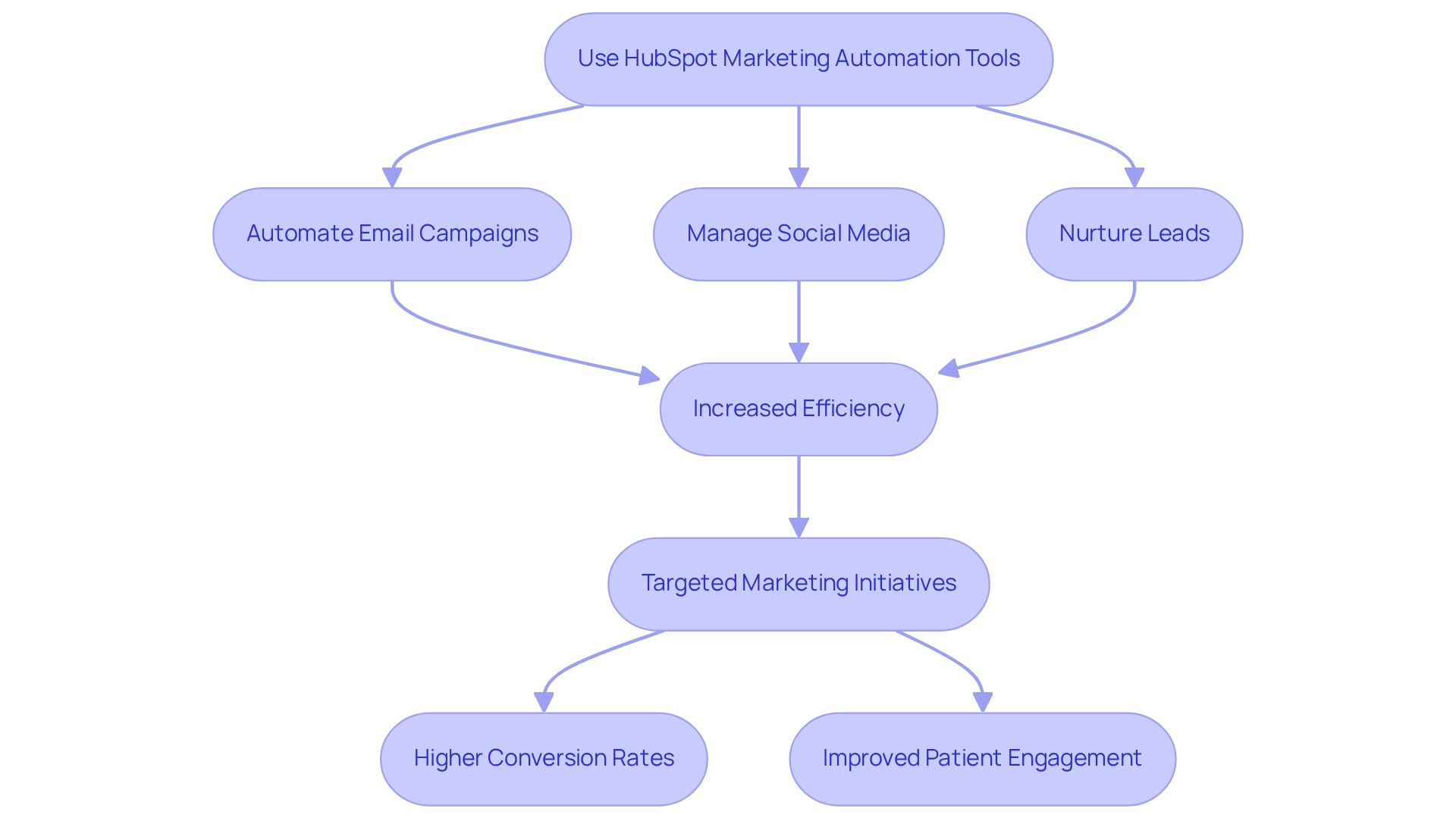
Microsoft Power BI: Interactive Reporting for Informed Decision-Making
Microsoft Power BI stands out as a robust business analytics tool, offering interactive visualizations and comprehensive business intelligence capabilities tailored for the healthcare industry. By utilizing Power BI, drug companies can create real-time dashboards that integrate information from various sources, aiding in the tracking of key performance metrics and the recognition of emerging trends. This functionality significantly enhances decision-making processes, enabling organizations to adapt swiftly to market fluctuations and refine their strategic initiatives.
Recent developments in Power BI have further solidified its role in healthcare analytics, with features designed to support real-time decision-making. Companies employing fully integrated information systems, including Power BI, report a remarkable 29% increase in the speed of decision-making across clinical and commercial ops. This acceleration is crucial, especially in an industry where the average net operating margin among short-term acute care hospitals is currently -8.9%. This statistic underscores the pressing need for efficient operational strategies, which Power BI can help facilitate by providing timely insights.
Moreover, expert opinions highlight that strategic investments in analytics capabilities, such as those offered by Power BI, are essential for driving innovation and improving patient outcomes. CareSet’s innovative Medicare data solutions, which compile extensive data from Parts A, B, and D, enhance medical strategies by offering insights into patient journeys and therapeutic treatments. This enables companies to make evidence-based decisions and overcome obstacles in understanding drug therapies. As the healthcare landscape evolves, the successful implementation of Power BI for decision-making has become a hallmark of effective commercial ops. Case studies show that organizations utilizing Power BI not only improve their analytical capabilities but also promote long-term strategic growth, ultimately optimizing the lifecycle management of medical products. For example, the case study named ‘Long-Term Strategic Growth for Healthcare Partners’ demonstrates how Power BI’s analysis, paired with CareSet’s data-driven strategy, allowed partners to recognize new opportunities and optimize their operations, aiding in sustained growth.
In 2025, the focus on business analytics tools such as Microsoft Power BI will continue to increase, with over half of pharma finance leaders reporting intentions to accelerate digital transformation via advanced data analytics and AI solutions. This trend illustrates a wider dedication to standardization and automation across various operational fields, ensuring that firms in the healthcare sector remain competitive and adaptable to the changing medical landscape. As highlighted in PwC research, these finance leaders are keen to ‘drive standardization and automate as many processes in every area where it makes sense,’ emphasizing the vital role of tools like Power BI, alongside CareSet’s information, in this transformation.
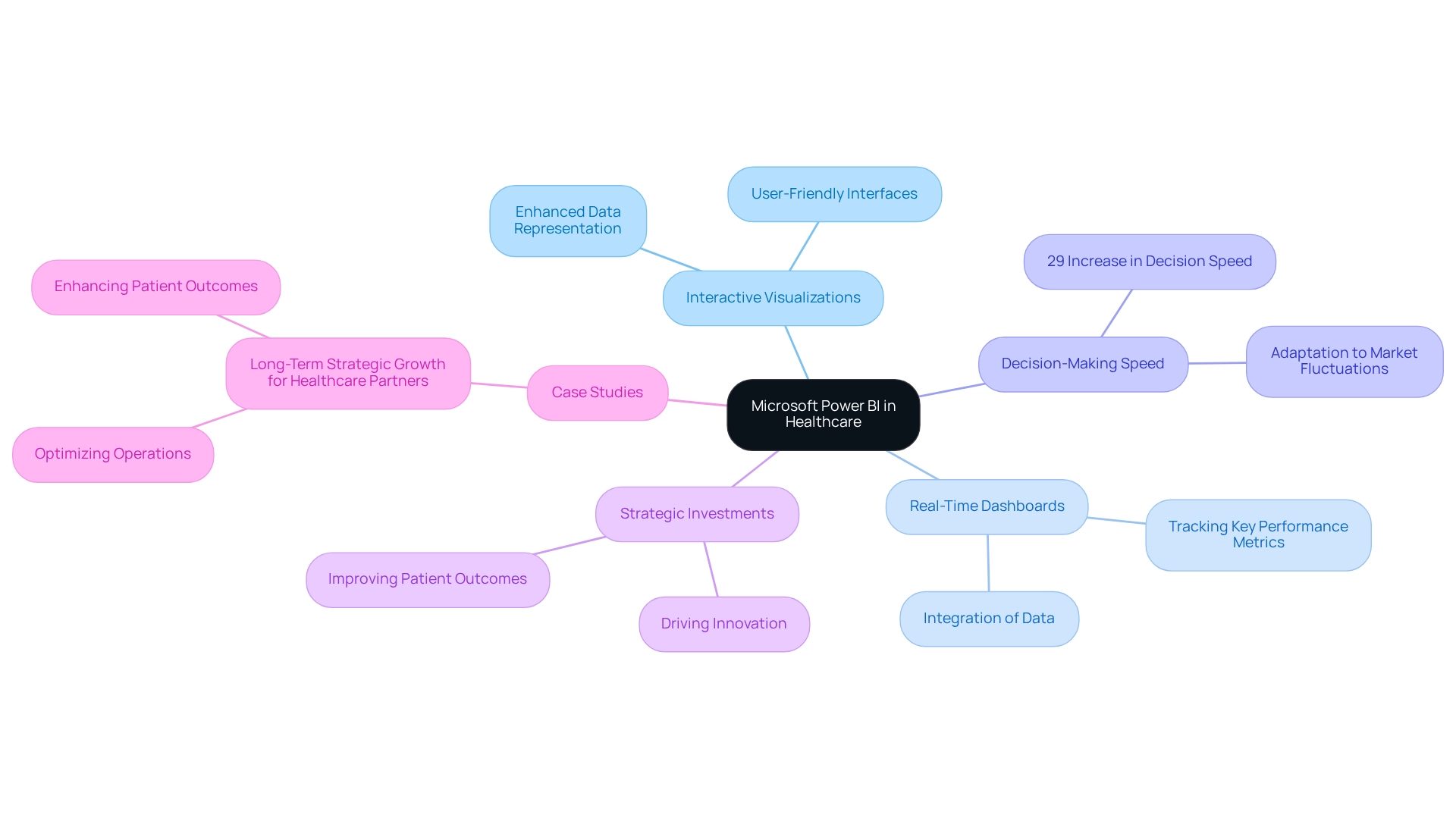
Oracle: Cloud Solutions for Efficient Data Management
CareSet provides extensive healthcare information insights that significantly enhance management processes for drug companies. With features designed for seamless integration, secure storage, and powerful analytics, CareSet’s solutions empower organizations to manage their information efficiently while adhering to stringent regulatory standards. This adherence is non-negotiable in the drug industry.
By leveraging CareSet’s insights, companies can improve their commercial ops and operational efficiency while ensuring information integrity, which is crucial for informed decision-making and strategic planning. The market value of cloud computing in the drug industry was USD 6,246.51 million in 2024, underscoring the necessity of adopting such technologies to maintain a competitive edge.
Furthermore, emerging trends in healthcare analytics, including real-world data integration and federated learning, underscore the importance of robust data solutions in navigating the complexities of data oversight and compliance within the industry. As Easly, an organization focused on home self-testing, remarked, ‘The result?’ Enhanced collaboration, accelerated processes, and streamlined workflows. This statement emphasizes how CareSet’s information can support these trends, ultimately aiding drug manufacturers in their commercial ops.
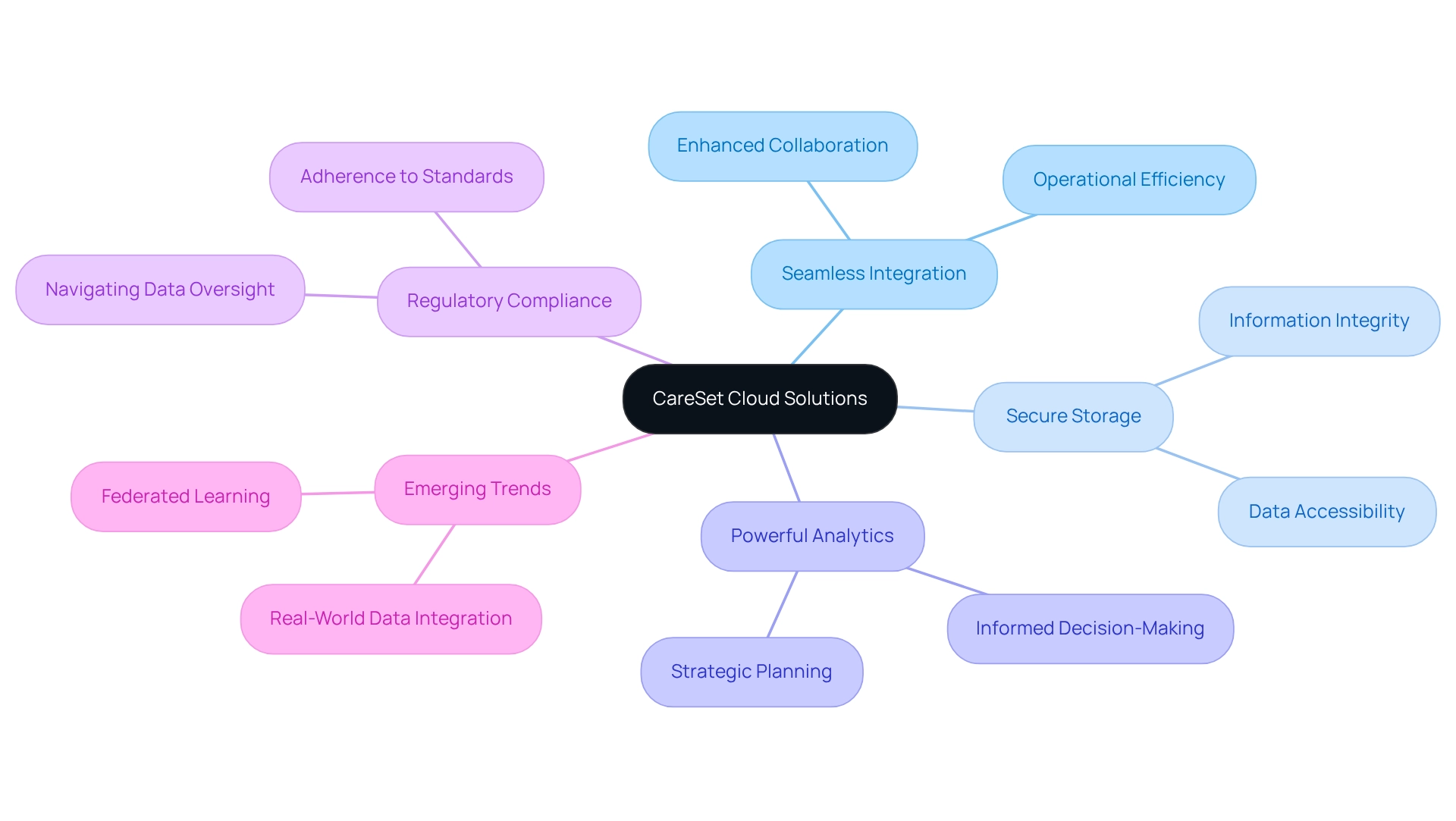
SAP: ERP Software for Integrated Business Processes
CareSet’s extensive healthcare data analysis empowers biotech firms to enhance their commercial ops. By integrating essential business processes with actionable Medicare insights, CareSet streamlines operations and fosters collaboration among departments. This integration is crucial for improving efficiency and aligning all teams toward shared objectives, ultimately leading to superior business outcomes.
Statistics reveal that the adoption of data-driven solutions in the drug industry is projected to grow significantly, with a marked increase in usage expected by 2025. A recent report indicates that the market for healthcare information solutions is anticipated to grow at a compound annual growth rate (CAGR) of 8% from 2021 to 2033, underscoring the rising dependence on these systems to navigate the complexities of the pharmaceutical landscape.
Case studies demonstrate the effectiveness of CareSet’s information solutions in practical applications. Organizations that have embraced CareSet’s insights report substantial improvements in operational efficiency and information accuracy. This enables them to react swiftly to market demands and regulatory changes, ultimately promoting long-term growth in the healthcare sector.
Expert opinions highlight that CareSet’s capacity to deliver practical information is vital for drug firms aiming to enhance their commercial ops. As industry analysts note, “The seamless flow of information across departments not only reduces redundancies but also cultivates a culture of collaboration, which is essential for driving innovation and maintaining a competitive edge in the industry.”
As advancements in healthcare data solutions continue to progress, CareSet remains at the forefront, providing cutting-edge insights tailored specifically to the needs of life sciences organizations. The impact of these solutions on integrated business processes is expected to be significant, paving the way for more agile and responsive operations in 2025 and beyond.
Zoho: Business Applications for Streamlined Operations
Zoho presents a suite of business applications meticulously crafted to elevate commercial ops within drug companies. Its offerings, encompassing CRM systems and project management tools, empower teams to collaborate effortlessly and manage workflows with precision. By automating routine tasks and delivering real-time information, Zoho significantly boosts operational efficiency in commercial ops, enabling organizations to focus on strategic initiatives that foster growth. This approach aligns seamlessly with CareSet’s philosophy, which underscores the importance of leveraging data-driven insights for sustained strategic growth within the healthcare industry.
As the pharmaceutical sector anticipates double-digit growth rates in analytics through 2030, the utilization of tools like Zoho becomes increasingly critical. Recent trends indicate a rising adoption of business applications in healthcare, with drug manufacturers recognizing the necessity for streamlined commercial ops to enhance productivity and compliance. According to Accenture’s Healthcare Analytics Benchmark Survey, drug companies that have adeptly integrated their data silos experience markedly accelerated decision-making capabilities, highlighting the significance of effective data management in their commercial ops.
By 2025, Zoho’s influence on operational efficiency is projected to be substantial, particularly in enhancing collaboration and workflow management within commercial ops. Companies that adopt Zoho’s solutions can anticipate improved communication across departments, which enhances their commercial ops, resulting in more effective project execution and expedited decision-making processes. This is crucial as drug companies also focus on regulatory compliance within their commercial ops, achievable through robust quality management systems and proactive audits.
Furthermore, escalating investments in research and development are driving growth in the drug manufacturing software market, underscoring the need for innovative solutions like Zoho to enhance commercial ops, refine drug production processes, and ensure compliance. This trend aligns with the industry’s shift toward integrated systems that promote superior data management and operational transparency.
Slack: Collaboration Tools for Enhanced Team Communication
Slack stands out as a premier collaboration platform that revolutionizes real-time communication among drug development teams. By offering dedicated channels for specific projects and topics, Slack enhances transparency and fosters seamless collaboration across various departments. This capability is especially crucial in the drug industry, where timely and effective communication can significantly influence project outcomes and operational efficiency.
In 2025, the impact of Slack on team communication is underscored by a notable trend: organizations utilizing collaboration tools like Slack report productivity increases ranging from 20% to 40%, based on a survey of 515 organizations. This statistic highlights the platform’s effectiveness in streamlining workflows and enhancing team dynamics. Furthermore, as of March 2023, the Slack app for Android reached over 10 million downloads, indicating its increasing popularity and user involvement within the productivity application market.
Case studies reveal that teams in the drug industry utilizing Slack have seen enhanced project outcomes. For instance, teams have leveraged Slack’s features to coordinate complex clinical trials, ensuring that all stakeholders remain informed and engaged throughout the process. This level of connectivity is essential in an industry where the stakes are high, and the need for accurate communication is paramount.
Expert opinions further underscore the significance of collaboration tools in the healthcare sector. Industry leaders recognize that platforms like Slack not only facilitate communication but also enhance overall project management, leading to more successful outcomes. As the demand for digital communication tools continues to rise, Slack remains at the forefront, equipping businesses in the healthcare sector with the necessary tools to navigate the complexities of their operations effectively.
Moreover, Slack’s innovative approach to connecting participants through gamification enhances engagement in healthcare projects, making it an invaluable asset for teams striving for success.
In summary, Slack’s role in enhancing collaboration and communication within healthcare teams is undeniable. Its ability to adapt to the unique needs of the industry positions it as an essential tool for driving efficiency and improving project outcomes in 2025 and beyond.
Asana: Project Management Solutions for Operational Efficiency
Asana serves as a robust project management tool tailored for drug companies, facilitating efficient organization and monitoring of their commercial ops. Its comprehensive features facilitate goal setting, task assignment, and progress tracking, collectively enhancing operational efficiency and accountability within commercial ops. By optimizing project workflows, Asana empowers organizations to meet deadlines and achieve strategic goals related to their commercial ops, thereby improving market responsiveness.
In 2025, the pharmaceutical industry increasingly recognizes the importance of data-driven insights for setting attainable objectives and optimizing resource allocation in commercial ops. CareSet’s innovative Medicare data solutions, encompassing detailed information from Parts A, B, and D, provide these crucial insights, allowing teams to leverage comprehensive patient journey mapping and therapeutic treatment effects. Asana’s capabilities align seamlessly with these requirements, enabling teams within commercial ops to collaborate more effectively and adapt to evolving project demands informed by CareSet’s data.
Successful implementations of Asana within life sciences have yielded substantial improvements in project tracking and accountability, illustrating its role in enhancing project workflows in healthcare. By integrating CareSet’s insights into project management processes—such as monitoring prescribing patterns and patient flows—drug manufacturers can further refine their strategies and enhance patient outcomes.
Recent statistics indicate that project management tools like Asana are becoming indispensable in the sector, with adoption rates experiencing significant growth. Asana’s commitment to delivering a user-friendly interface and comprehensive project management solutions positions it as a leader in driving efficiency for pharmaceutical companies, particularly through its commercial ops in 2025.
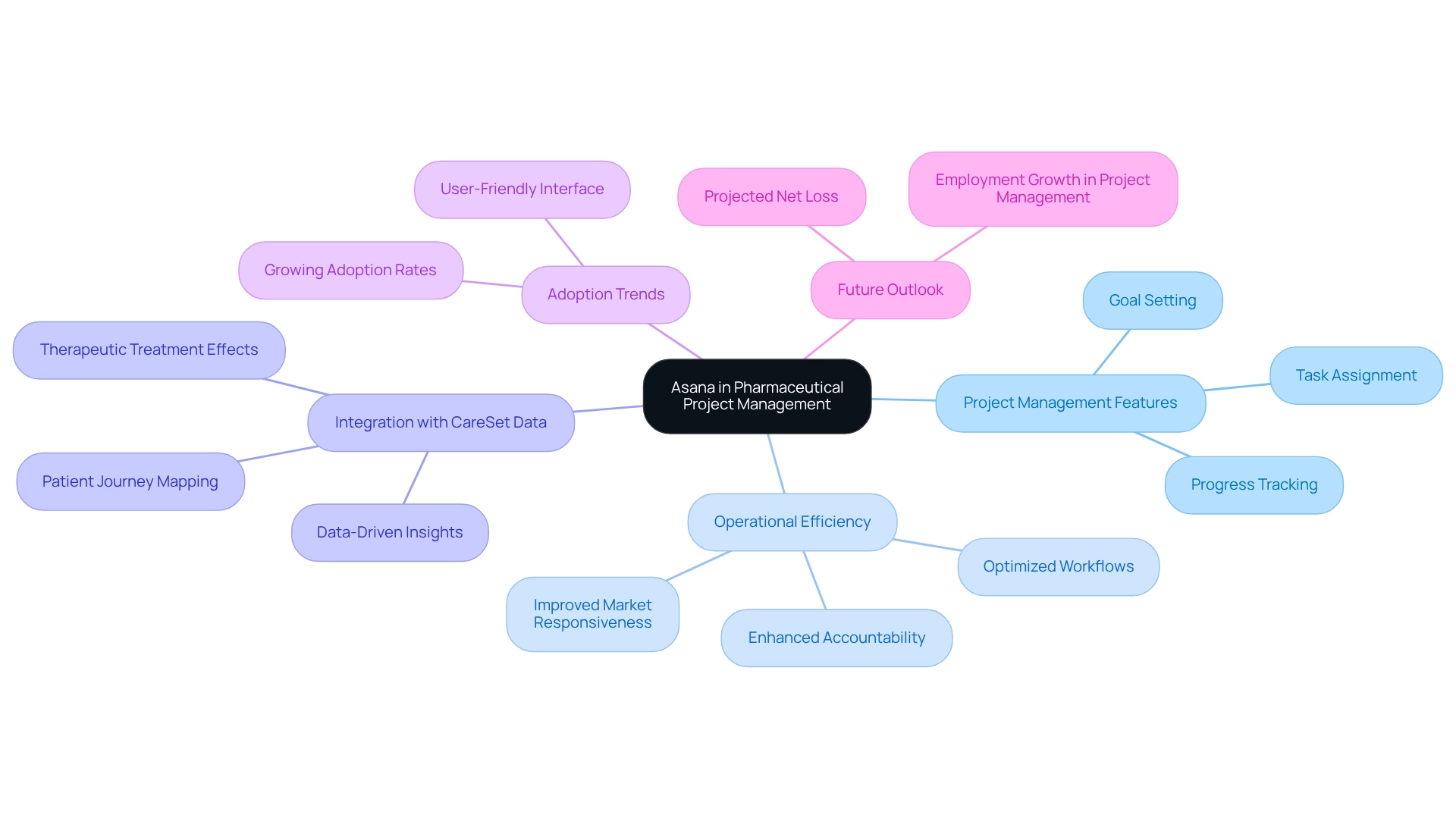
Conclusion
The integration of data-driven technologies in the pharmaceutical industry is indeed a game-changer, equipping organizations with essential tools for enhanced operational efficiency and strategic growth. CareSet’s Medicare data analytics offers invaluable insights into patient demographics and treatment patterns, enabling companies to refine their market access strategies while improving patient engagement. When combined with Tableau’s powerful visualization capabilities, these insights transform into actionable data that facilitates informed decision-making and trend identification.
Furthermore, Salesforce’s robust CRM solutions streamline commercial operations, allowing pharmaceutical companies to concentrate on building meaningful relationships with healthcare providers. As these organizations adopt innovative marketing automation tools like HubSpot, they can enhance their outreach strategies, ensuring targeted and effective communication that ultimately leads to improved patient outcomes. Additionally, Microsoft Power BI and other advanced analytics tools empower companies to make real-time decisions, adapting swiftly to the evolving healthcare landscape.
As the industry progresses towards a greater reliance on integrated systems, tools such as Zoho and Slack become vital for optimizing operations and fostering collaboration among teams. The shift towards data-driven solutions is not merely a trend; it is an essential strategy for navigating the complexities of healthcare and maintaining a competitive edge. By embracing these technologies, pharmaceutical companies can enhance their operational frameworks while also contributing to improved patient outcomes and sustained business success. The future of the pharmaceutical industry hinges on the ability to leverage data effectively, paving the way for innovation and growth in the years to come.


